Gossip columnists, who like to expose the "humanity" and "feet of clay" of overblown celebs, politicians and other public figures, will treat you "a little gentler" if you talk to them.
That was one of the messages given by columnists Richard Johnson, George Rush and Jo Piazza at a panel sponsored by the Center for Communication April 22 at the New School, New York. Michael Riedel theater critic of the New York Post, moderated.
Social media have turned just about everyone into gossip columnists, the writers said.
There is such a great demand for gossip about celebs that the columnists have had to create “faux celebs” to satisfy it, they said.
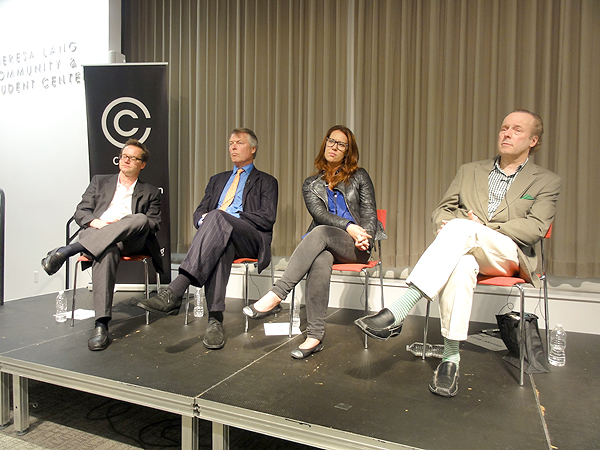 |
Piazza, executive news director, In Touch and Life & Style, and author of Celebrity Inc.: How Famous People Make Money, said “Celebrities control so much of what people think, what they buy, what they do, that there needs to be that system of checks and balances, calling them out and keeping them honest.”
Kardashians Are Everywhere
If you’re wondering how Kim Kardashian can wind up on the covers of five supermarket celeb mags at the same time, and you think perhaps they are coordinating on this, you are right, said Rush.
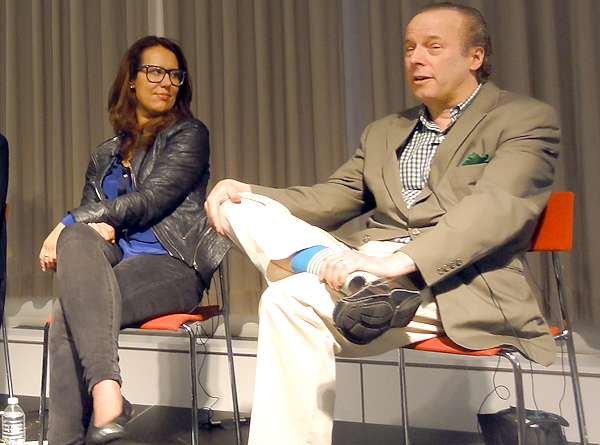 |
West Coast publicist Jordan McAuley authored Celebrity Leverage in which he claimed that a “celebrity mania” is gripping the country and especially the marketing, advertising and PR worlds.
Rush has co-authored with his wife Joanna Molloy Scandal, A Manual: The Inside Story from America’s Infamous Gossip Columnists. The Rush & Molloy column ran from 1995-2010 in the Daily News. They also worked for Page Six of the New York Post in the early 1990s.
Pressures on Columnists Aired
The panelists discussed the pressures on them to run or not run certain items.
Rush said his editors would sometimes question an item of little news value but it was a “payback” for someone who had given him a good tip and he said he would fight to keep it in the paper.
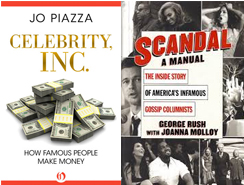 |
A question from a member of the audience of more than 150 asked, “How common is it for the sword, or the pen, to be for sale?
The panelists, including Johnson, former Page Six editor who has returned to the New York Post with his own thrice-weekly column after three years on the West Coast, parried the question and would not admit to improper behavior. The question and the answers to it became part of Gawker’s coverage of the panel.
Rush noted that Foster Wynans, who edited the “Heard on the Street” column for the Wall Street Journal, went to jail (serving 18 months) for giving tips to his friends who bought stock.
His successor was Dean Rotbart, who was a reporter, editor and columnist for WSJ for seven years, including writing the Heard on the Street column. A more candid description of the horse-trading and favored treatment that goes on between reporters and their sources was in a talk that Rotbart gave to the 1993 PRSA national conference in Orlando. Journalists actually like people who don’t talk to them because “they need some people to beat up on in order to maintain their credibility,” said Rotbart. He said journalists protected financier Ivan Boesky, who later served time in jail for various offenses, because he was such a good source of tips.
Favors to sources, said Rotbart, include ignoring “minor negative news items.”
Rush said that PR reps may try to talk a columnist out of a negative item about a client by promising an even juicier item about someone else. In general, he said, publicists need to be “disciplined.”
Outrageous Gifts Sometimes Provided
“Outrageous gifts” are sometimes sent to media, said Rush, recalling that he once saw “crates of Dom Perignon champagne” in the lobby of a publication. Such gifts are sent back to the source or donated to charity, he said.
Piazza said it “depends on what you mean by ‘for sale.’” Columnists get invited to club and resort openings in countries around the world as well as invites to dinners and other events, she noted. Columnists have to come up with their own code of ethics, she added.
The columnists said they have to be very discreet about what they report about private functions if they expect to be invited back.
Rush said it's naïve for a news source to think that a dinner may sway a columnist.
Lawsuits Often Threatened
Johnson said columnists are often threatened or even hit with legal actions but he has experienced only one “successful” legal action involving him in a career that included editing Page Six for nearly 25 years until 2010 when he was named to head the “Flash” gossip section for the News Corp.’s tablet newspaper, The Daily. That folded in late 2012.
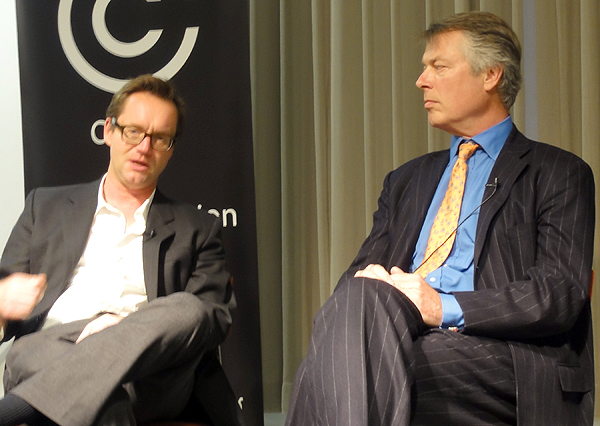 |
He would not discuss the action but it may have been related to the alleged attempted extortion of investor Ronald Burkle by Page Six reporter Jared Paul Stern. Gawker called it the “most famous scandal under Johnson’s watch.” Stern in 2006 reportedly sought hundreds of thousands of dollars for keeping damaging gossip about Burkle out of Page Six.
Johnson was reprimanded in 2007 for taking a Christmas gift of $1,000 in 1997 from restauranteur Nelo Balan who frequently received favorable coverage.
Rush said people who talk to the columnist are apt to get treated “a little gentler.” Those who don’t return phone calls or who out-and-out refuse to talk, are apt to get different treatment, he said.


 Trump Media & Technology Group today reported a $58.2M net loss on $4.1M in 2023 revenues, a disclosure that drove its stock price down 22.6 percent to $47.96.
Trump Media & Technology Group today reported a $58.2M net loss on $4.1M in 2023 revenues, a disclosure that drove its stock price down 22.6 percent to $47.96. Barry Pollack, an attorney at Wall Street’s Harris St. Laurent & Wechsler, has registered Julian Assange as a client with the Justice Dept. “out of an abundance of caution.”
Barry Pollack, an attorney at Wall Street’s Harris St. Laurent & Wechsler, has registered Julian Assange as a client with the Justice Dept. “out of an abundance of caution.” Paramount Global to slash 800 jobs in what chief executive Bob Bakish calls part of an effort to “return the company to earnings growth"... Rolling Stone editor-in-chief Noah Shachtman is exiting at the end of the month due to disagreements with chief executive Gus Wenner over the direction the magazine is taking... The New York Times broke the $1 billion barrier in annual revenue from digital subscriptions in 2023... Press Forward is investing more than $500 million to strengthen local newsrooms.
Paramount Global to slash 800 jobs in what chief executive Bob Bakish calls part of an effort to “return the company to earnings growth"... Rolling Stone editor-in-chief Noah Shachtman is exiting at the end of the month due to disagreements with chief executive Gus Wenner over the direction the magazine is taking... The New York Times broke the $1 billion barrier in annual revenue from digital subscriptions in 2023... Press Forward is investing more than $500 million to strengthen local newsrooms.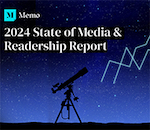 The majority of news articles are read within the first three days of publication, according to a recent report.
The majority of news articles are read within the first three days of publication, according to a recent report. The Los Angeles Times gives pink slips to 115 people or 20 percent of its newsroom staff... TIME is also laying off about 30 employees, which is approximately 15 percent of its editorial staff... The Baltimore Banner, which was launched by Stewart Bainum in 2022 after he failed to buy the Baltimore Sun, added 500 subscribers per day in the three days following Sinclair Broadcast Group's deal to purchase the Sun.
The Los Angeles Times gives pink slips to 115 people or 20 percent of its newsroom staff... TIME is also laying off about 30 employees, which is approximately 15 percent of its editorial staff... The Baltimore Banner, which was launched by Stewart Bainum in 2022 after he failed to buy the Baltimore Sun, added 500 subscribers per day in the three days following Sinclair Broadcast Group's deal to purchase the Sun.


 Have a comment? Send it to
Have a comment? Send it to 
No comments have been submitted for this story yet.